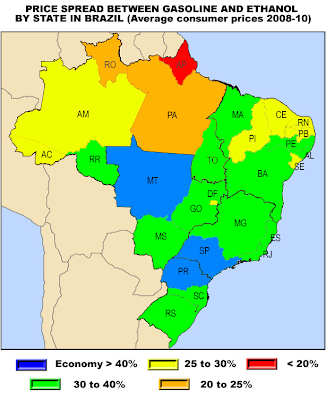BIG BIOFUELS DEAL FOR BRAZIL
Shell and Cosan: Fuelling a Lower-Carbon Future With Biofuels; Multi-billion dollar joint venture that will become a leading producer of the low-carbon biofuel, ethanol made from sugar cane
3 June 2011 (PR Newswire via World of Renewables)
"…In one of the biggest biofuels deals to date, Shell is combining its extensive retail experience, global network and research in advanced biofuels with Cosan's technical knowledge of producing biofuels on a large scale. Raizen will produce and sell over 2 billion litres a year of the lowest-carbon biofuel commercially available - ethanol made from Brazilian sugar cane.
"Shell is already one of the largest distributors of sustainable biofuels: now it is moving for the first time into production…Raizen will distribute biofuels and over 20 billion litres of other industrial and transport fuels annually through a combined network of nearly 4,500 Shell-branded service stations. In Brazil it becomes the third largest fuels company. Plans would extend the company's reach in future years to export more ethanol to other key markets…Low-carbon biofuels will be the most practical and commercially realistic way to take carbon dioxide (CO2) out of transport fuel…[The deal] combines Shell's…[and] Cosan's…[strengths and] has the potential to accelerate the commercial production of biofuels from crop waste and inedible plants."
 from Wikipedia - click to enlarge
from Wikipedia - click to enlarge"Raizen's 24 mills can process up to 62 million tonnes of cane into sugar or ethanol each year, with the flexibility to adapt to market demand…New energy policies in Europe and the USA are calling for more renewable, lower-carbon fuels for transport. Biofuels make up around 4% of transport fuel in Europe, and 3% in the USA. Globally biofuels currently meet around 3% of road-transport fuel demand. Shell expects this to rise to about 9% by 2030…Brazil leads the world in the use of biofuels for transport. They are likely to make up more than 40% of the country's transport fuel mix by 2030, double today's proportion. Raizen's current annual production capacity will be enough to meet nearly 9% of Brazil's current ethanol demand…At the pump Brazilian motorists are offered the choice of pure ethanol or a blend of petrol (gasoline) and ethanol. Around 90% of the country's new cars can run on either fuel type…
"The sugar cane-to-ethanol process used by Raizen is the most efficient in turning biomass into fuel. Brazilian sugar cane yields 7,000 litres of ethanol per hectare of cane compared to, for example, 3,800 litres for a hectare of corn in the USA and 2,500 litres for a hectare of wheat in Europe…Turning sugar cane into ethanol offers a number of environmental benefits over other biofuel production processes…"
 if its going to be 1st generation ethanol, it should be sugar ethanol (click to enlarge)
if its going to be 1st generation ethanol, it should be sugar ethanol (click to enlarge)"…Ethanol made from Brazilian sugar cane produces around 70% less CO2 than petrol, when the cultivation and production processes are taken into account. Since 2003 the use of ethanol in Brazil has avoided over 103 million tonnes of the CO2 that the petrol it has replaced would have produced…By-products from turning sugar cane into ethanol are recycled as organic fertiliser. Plant waste, called bagasse, is burned to produce power for the processing mills and surplus energy is supplied to the national grid.
"To further improve productivity, Raizen will use its own advanced geographical information system to monitor its land. This allows its scientists to make accurate predictions about crop yields and adjust fertiliser or pest control, for example, to help boost production…The deal includes part of Shell's interest in the firm Iogen, which uses enzymes to break down plant waste into ethanol, as well as Shell's interest in Codexis, developers of ‘super-enzymes’ for the faster conversion of plant waste into transport fuels…Raizen will work to improve the sustainability of its operations. Sugar cane for ethanol requires little water to be added because Brazil's tropical rainfall provides natural irrigation. In the industrial process Raizen has been introducing a system that recycles up to 90% of water used…"








0 Comments:
Post a Comment
<< Home